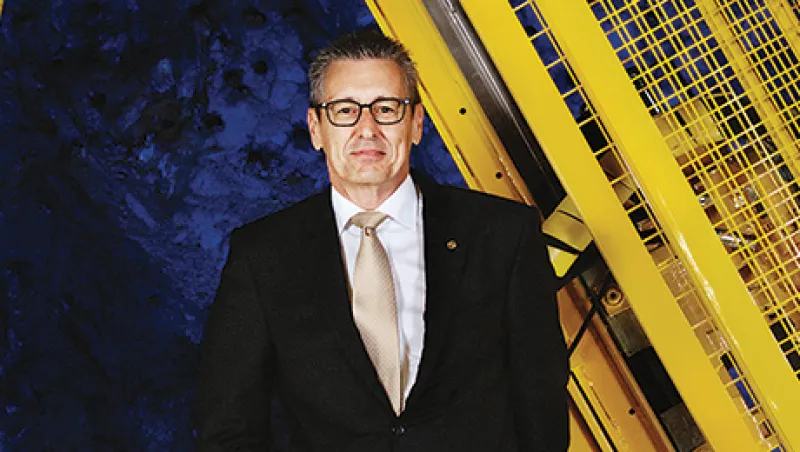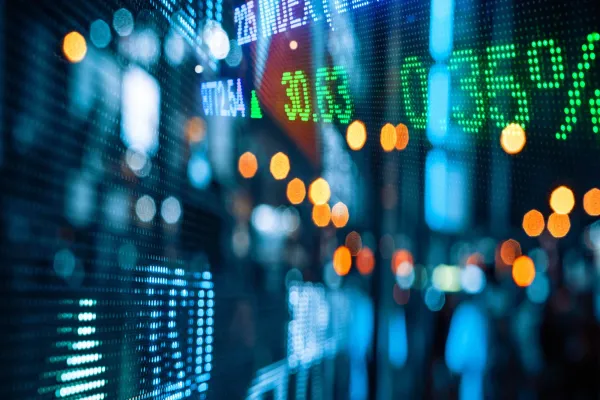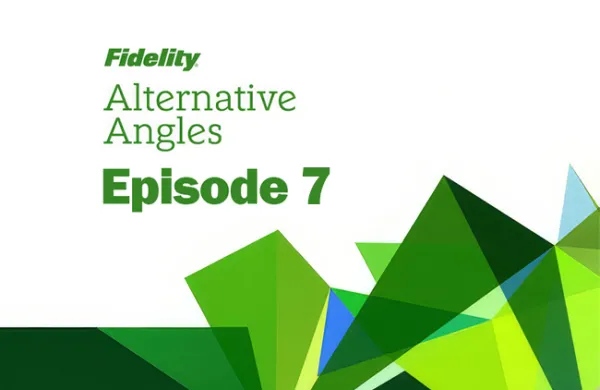Sluggish growth, fierce global competition and volatile financial markets are challenging business executives around the world. Ronnie Leten knows the drill as well as anyone.
As CEO of Atlas Copco, the Swedish maker of industrial equipment, Leten could be forgiven for feeling as tightly squeezed as the air in one of the company’s vaunted compressors. The collapse in global commodities prices has hammered demand for mining equipment, one of the company’s four main businesses. The debt crisis and rolling regional recessions have depressed its core European market. And sluggish global growth had kept a lid on capital investment in much of the industrial world, tempering demand for the company’s construction equipment and industrial compressors and tools.
But Leten isn’t one to complain. The no-nonsense Belgian is all about execution, and he believes Atlas Copco can prosper in good times as well as bad by expanding its service business, growing market share and pursuing innovation to open new markets.
It helps that the Swedish company has always run a lean shop — more of a marketing company with a manufacturing back-end than a production-oriented company, says Peder Frölén, an analyst at Handelsbanken in Stockholm. Leten has trimmed the workforce in response to plunging demand for drilling and rock excavation equipment but hasn’t had to undertake any drastic restructuring. “We are an asset-light company,” he explains. “We do not have these huge factories where we have to write down a big part of our balance sheet.”
Leten doesn’t see the capital expenditure cycle rebounding dramatically anytime soon, but Atlas Copco can prosper by servicing the equipment it has already installed in mines and factories around the world. Services now generate nearly 60 percent of the company’s revenue.
He’s finding growth with bolt-on acquisitions, like last year’s $1.6 billion purchase of Edwards Group, a U.K. maker of vacuum equipment for the semiconductor industry, and the acquisition of Henrob, a private U.S.-based maker of riveting equipment. Henrob provides rivets for the aluminum body of Ford Motor Co.’s new F-150 pickup model, and Leten sees strong growth ahead as automakers shift to aluminum bodies to cut vehicle weights and increase mileage.
Leten, 58, is a virtual Atlas Copco lifer. He joined the company in 1985, rose through the ranks to run the compressor division — it generated nearly a quarter of the group’s 50.9 billion kronor ($6.2 billion) in revenue in the first half and just over half its 9.6 billion kronor in operating profit — and took over as CEO in 2009. He also serves as chairman of Electrolux, the Swedish appliance maker. He enjoys the strong backing of Investor, the Wallenberg family holding company that controls both groups, and owns 26 percent of Atlas Copco. Leten’s style — don’t worry about the world, just fix your business — is perfectly suited to today’s climate, says Andreas Willi, an industrial analyst who covers Atlas Copco at Deutsche Bank. “If I owned a business, I would hire him to run it,” he adds. Leten recently discussed his approach and the outlook for Atlas Copco with Institutional Investor’s International Editor, Tom Buerkle.
Institutional Investor: You had 10 great years when commodities only went up and people wanted bigger and more equipment, but the last couple of years have been really tough. How do you handle such a sharp swing?
LETEN: The equipment goes together with the capex cycle. But on the other hand, almost 60 percent of our business is the returning business, the consumables — services, consultancy, all that part. Although the capex cycle is low due to the drop of commodities prices and maybe some overinvestments, I think the volumes are still okay. And I think as people are using the equipment and using consumables, we even get growth on that side.
Of course you have to adapt to suit. It’s a pity that you have to reduce your workforce. Have you scaled back enough?
You’re never, as the CEO, as efficient as you would like to be, that’s for sure. We have done significant reductions on the mining side; over the cycle, almost 3,000 people. We are still doing some small add-ons here and there where we do some small restructuring. But Atlas has never come up with one single big restructuring program. The way we handle it, which keeps you much more honest, is to do it step by step, quarter by quarter, if it’s needed.
Why is that better?
I feel it’s respecting the staff. I also would like to keep close to the business and do this type of adaptation in the most efficient way. I don’t want to create a big bunch of restructuring in one pop, which is not visible, not transparent, even if it’s easier to communicate. We have always decided to take charges as they’re really needed. And to do them, definitely do them.
Our business model is an agile, resilient business model. When volume drops, we’re able to adapt, and when volume comes up, we are able to deliver. Agility in an organization is to be restructuring without restructuring costs. If you can adapt to a new norm without really having restructuring costs, then you are really at operational excellence.
Can you continue to grow services as a share of the business?
The service we do is proprietary, meaning it is service for our installations, our equipment. We give peace of mind to the owner of the equipment. The competitor is not another service company, like IBM competing with HP. We are competing with the owner. We need to convince the owner, “Hey, you are much better focusing on the core business. When it comes to tools, when it comes to mining service, when it comes to compressor service, we know better than you, and we can do a much better job at a much better quality.” That is the phase we are in, and I believe that growth cycle is definitely not over.
There’s been a lot of talk about the “new normal” — sluggish rates of growth, subdued investment. Do you think that describes the world today?
We should not forget there was a big China, and I don’t know how many Chinas there are in the world. Maybe Iran. But I think for the time being, the real tailwind we had in the capex cycle is not so strong. I don’t see it coming back in the next year or whatever. The U.S. and Europe are not doing so bad, but can they replace fully the cycle in China? Most likely not.
What do you do if it’s hard to generate topline growth?
There are no secrets. The way to do it in our business is to drive innovation, to come up with some transformation in the way we work with our customers. You can maybe make a comparison between a PC and an iPad. Second, we still don’t have 100 percent market share. We don’t have even 50 percent market share, so there is still more to take. And third is to look for opportunities. During this time of lower capex, for sure there will be some competitors who are getting stressed, and I think you have the opportunities to have the right acquisitions.
In which product areas are you most optimistic about innovation and growth?
Compressors, the vacuum business and the industrial tools business — these are the three that have the biggest potential. That is also where we are market leaders, where we have the biggest concentration of design and development. And where the end market is still positive.
What lessons do you draw from the Edwards deal? Do you see more potential for those kinds of deals?
The deal was transformational for our organization because it created a new platform. We will have work for the next ten, 20 years to fulfill our ambition of becoming the undisputed leader in vacuum. With the Henrob acquisition, we are the provider of the rivets for the F-150. It’s very difficult to weld aluminum, so you need to rivet. The deal was very strategic because we saw that there will be more cars like that produced, and there will be other adjoining technologies needed.
How confident are you about China? What kind of growth track do you think the country is adjusting to?
Publicly they say 7 percent. Is it true? Let’s take it that it’s correct. At the time they were doing 10 percent and more, the economy was much smaller. Today the economy is significant, and it’s still growing. Maybe not at the official figure; maybe it’s growing at 3, 4 percent. Give me a couple of Western countries that are growing at 3, 4 percent.
I would make a mistake if I didn’t give high attention to China because of this transformation to a consumption-oriented market. These products need to be produced. You need to produce cars, airplanes, washing machines, flat-screen televisions, phones.
Is Europe back?
With the [strong] dollar, I think it’s good for Europe. It makes Europe more competitive. We have seen it in our last quarter. We saw growth in every segment in every country. There is more confidence among business people. The whole Greek saga, which distracted a lot of attention, is hopefully now normalized. So yeah, I’m rather positive on Europe. And that is the best for Atlas. Europe is where we have our largest market share, we have the biggest service penetration, we have good margins. So that’s the best place for us to grow.
Can you maintain those margins without good topline growth?
There are two main reasons why we have higher margins than our colleagues. It starts when you look at the products. We are perceived by our customers to create the biggest value, so we have a price premium. We are also, most of the time, market leaders, so we also have a cost leadership. And if you look at our service, none of our colleagues have the same focus on services and the same penetration as we have. And that also gives a premium in profitability.
Now, do you believe, Ronnie, you can keep this type of margin? To be honest, yes. If we keep driving on the innovation, reinventing all the time ourselves, I’m sure we can.
Exchange rates have lifted revenue and orders. Will it affect your investment decisions going forward?
No, no. We believe we should produce and we should invest where the market will be. Europe is a big economy, so we have to be there. North America is a big economy; we need to be there with our own factories, our own engineering. And the same is true in Asia, and I’m talking India and China. We have a rather regional setup in our manufacturing because we believe we need that. Otherwise, you cannot be sustainable, profitable, in our business.
How do you run a business like Atlas in the midst of the financial volatility we’ve seen in recent months, particularly in China?
The stock exchange, it is what it is. I’m trying to be good at running the company. When it comes to currency, we need to make sure that in [countries with] very volatile currencies, we get paid in dollars or in euros and run with a lean balance sheet in that country. And if you don’t produce in countries where the currency is devaluating, you need to make sure to increase your prices. We have a very good routine on that. Our central bank, the Atlas Copco central bank, is immediately alerting local management and divisional management, “Hey, guys, you need to take measures; make sure you do it.”
Does having a core shareholder like Investor make your job easier or harder?
I think it gives you a long-term perspective, the possibility to work fundamentally, to work really through the different cycles. But you know, Investor expects performance. I always say that to perform every month is the best long-term strategy because that gives peace of mind. But I don’t need to worry about who will be running the board next or will we change strategy again because there is consensus on the strategy. We need to focus on execution.
Looking forward, what’s your biggest worry?
How we can find growth opportunities on the equipment side. It’s like the mouse looking for the cheese. We need to look for opportunities and not just wait and see where the wind is coming from. Looking for opportunities and motivating people to do that, that is my biggest challenge. •
Follow Tom Buerkle on Twitter at @tombuerkle.






